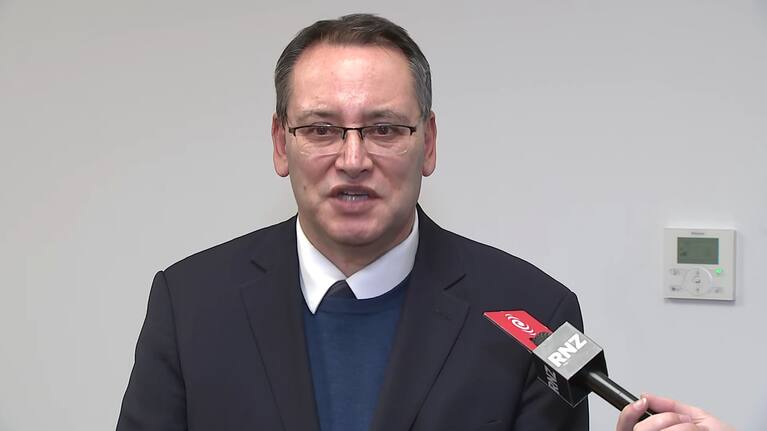Analysis: The Health NZ boss learned a hard lesson in Scrutiny Week. Other public service bosses should take note, writes 1News digital political reporter Felix Desmarais.
"No comment."
That was the answer Health NZ Te Whatu Ora boss Margie Apa gave before 1News had even asked a question after a select committee hearing as part of Scrutiny Week on Wednesday.
What ensued was a slow speed escape from accountability down a couple of corridors, Apa then claiming she was rushing to another meeting.
It was the first of three reasons she proffered for not answering questions - which she later apologised for.
Scrutiny Week is a new initiative at Parliament, aimed at making sure there is time and space for ministers and highly-ranked public service officials to be held accountable for their decisions. It sees ministers and often the relevant chief executive front a select committee at Parliament, facing questions mostly from opposition members.
As is convention at the end of select committees, ministers and those bosses exit the room and are often greeted by media to nail down the nitty gritty of what they said, or other issues of public interest.
This is what happened on Wednesday: Apa left the select committee and was asked to stop to answer a few questions.
The questions were about concerns over whether graduate nurses would have jobs to go to in Te Whatu Ora hospitals. It's a matter that potentially affects not just those graduate nurses, but also the wider public.
Health New Zealand's boss has apologised and promised she'll do better, Benedict Collins reports. (Source: 1News)
There is no doubt public service chief executives are very important, very busy people.
They should be. Their roles have a high level of responsibility. Their decisions matter, and affect the public. They are also paid from the public purse, commanding salaries that soar about the average New Zealander's. Apa, for example, reportedly earns $864,000 for her role as Health New Zealand chief executive.
That remuneration - for any public service boss - reflects not only the massive responsibility of the role, and the expertise required to handle it, but also the level of public accountability and scrutiny that comes with it.
The meeting Apa was rushing to was, no doubt, important. But her accountability is also important, and she has an obligation to answer to the public through the media. To not do so is to disregard the public's right to know.

The "no comment" said it all.
Apa has since said she had not been briefed on the matter, but she'd already said "no comment" before she knew what the matter was.
As she said yesterday, after hearing the question, she could have said she had not been briefed on the issue and would get back to the reporter with the answer. But she continued to walk, then denied an interview request on Thursday, before finally fronting on Friday.
1News is aware of at least one other public service boss who claimed to be too busy to speak to the press during Scrutiny Week, but later apologised and made themselves available. So Apa was not alone in that attitude.
Other public service bosses, however, were happy to front. The Police Commissioner did so, and Oranga Tamariki chief executive Chappie Te Kani made himself available evidently unprompted, standing alongside Minister for Children Karen Chhour and offering answers to any questions thrown his way.
Health Minister Shane Reti said he expected health agencies to "engage respectfully and proactively with the public through the New Zealand media".
It makes the Government's expectations clear. And those expectations reflect the public's - that those in power be held to account.
Apa learned the lesson the hard way this week. She's apologised, fronted and says she'll do better.
Public service bosses would do well to learn through her misstep.





















SHARE ME